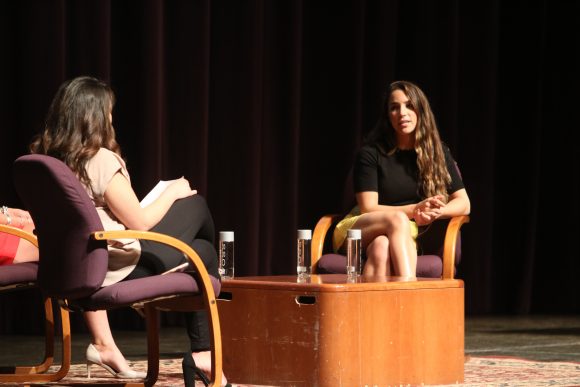
Olympic athlete Aly Raisman speaks at Macky Auditorium. April 12, 2018. (Lucy Haggard/CU Independent)
Opinions do not necessarily represent CUIndependent.com or any of its sponsors.
Aly Raisman is only 5-foot-2, and yet I could feel the passion and energy she delivered from the very last row of the auditorium.
Raisman spoke at the CU Macky Auditorium on the evening of April 12 at the Conference of World Affairs. I showed up at the last minute, getting lost as usual, and walked into a packed theater. There was a buzz surrounding the audience of high hopes for an empowering message to be delivered.
Raisman delivered just that.
As an unashamed supporter of the #MeToo movement, Raisman had blunt words to say about sexual abuse that are as important now as ever. Throughout the night, the word she used most was “disgusting,” an apt word to describe sexual assault.
Sexual assault is a prominent problem not only in gymnastics and Hollywood but on college campuses as well. According to RAINN (Rape, Abuse & Incest National Network), 23.1 percent of females and 5.4 percent of males experience sexual assault during their college career. Sexual assault is, in fact, the most prominent crime on college campuses — for every one robbery committed, there are two sexual assaults.
CU is not exempt from this horrific frequency of sexual assault cases; on campus, sexual assault is pervasive both in the case of student offenders and offenders with positions of authority.
In November of 2016, former assistant football coach Joe Tumpkin was accused of sexual abuse. The victim, Pamela Fine stated: “I am no longer protecting the men who silence victims in the name of winning football games.”
Lisa Simpson was raped while intoxicated in 2001 by football players on the CU team, and eventually left without earning her degree. She filed a lawsuit due to the lack of action taken by the university.
In May of 2014, another student was sexually assaulted during a party by a peer. The offender, Austin Wilkerson, promised to take care of the victim after she drank too much at a party.
Raisman cites the reason for this proliferation of sexual assaults is a lack of accountability. Raisman has, herself, been recently involved with the lawsuit concerning Larry Nassar, the Olympic team doctor that has been accused of molesting over 100 young gymnasts for over two decades. Nassar was also employed at Michigan State, where he continued to assault athletes.
On January 24th, Nassar was found guilty and sentenced to 175 years in prison. However, the case has yet to generate an investigation into USAG (USA Gymnastics) or at Michigan State. Nassar may have been found guilty by the justice system, but the organizations that enabled him are not being put under scrutiny. No one is holding the abusers, or those who enable the abusers, accountable.
On college campuses, this is no exception.
According to a Huffington Post analysis, students found guilty of sexual assault were only expelled 30 percent of the time and suspended 47 percent of the time. This can be attributed to the lack of action that universities take.
A student who was a victim of sexual assault at Harvard University wrote an anonymous article for the school newspaper, and within it, she states the problem: “It’s so ambiguous. It’s so — at least if you go to the police, you know the procedures. At a school, you don’t really know. It’s this murky unknown.”
Universities are not equipped to deal with allegations of abuse, and it doesn’t seem like there’s going be a set of guidelines put in place anytime soon. In September, the Trump administration rescinded the set of protocols put in place by the Obama administration. The most prominent of those protocols was “Dear Colleague,” which allowed universities to find a student guilty of assault if it seemed to be “more likely than not.” Prior to this policy, clear evidence was needed to find a student guilty.
The guidelines need editing, but what the Obama administration had installed was at least a start. The issue of sexual assault is polarizing for party lines, but it shouldn’t be. When parents send their children off to school, they aren’t thinking of whether the laws in place were set by Republicans or Democrats — they’re merely thinking they want their kids to be safe.
And the children of those parents, like myself, who actually go to school on these campuses, feel the same way. I don’t care who makes the law, but feeling safe on campus is of utmost importance. Nationwide — CU included — there is a need for change.
During her conference, Raisman spoke about a situation where a sexual assault was brushed under the rug because the perpetrator was the star of the football team. As Raisman would say, this is “disgusting” and unacceptable. Institutions and organizations have power, and it is often used in a way that protects the abuser in order to maintain a certain image or reputation.
Raisman believes (and I agree) there’s a way to solve this: the media.
Although it is difficult to talk about, as Raisman stated multiple times, it is necessary. The more the media covers not only the Nassar case but all sexual assault cases, the more attention those cases receive. And the more attention they get, the more likely change will finally be made.
It’s not always comfortable to talk about, but it’s necessary. It’s important that everyone knows exactly what’s going on, and that everyone, in the words of Raisman, gets “pissed off” about it. If we use the media to start getting attention, then policy changes have a higher likelihood to follow.
Contact CU Independent Staff Writer Lauren Ogg at lauren.ogg@colorado.edu.
